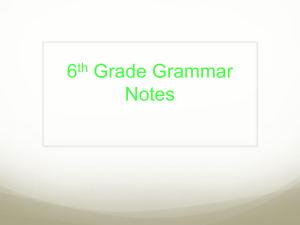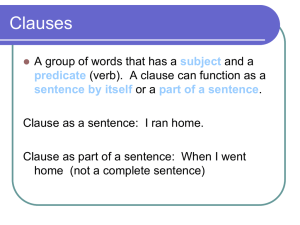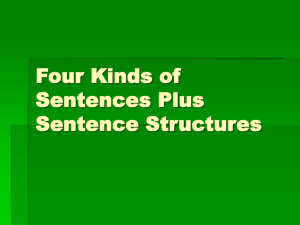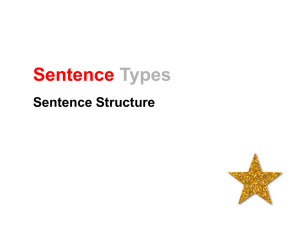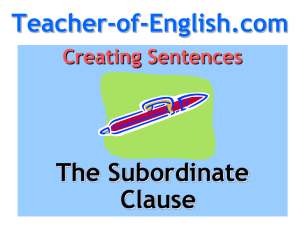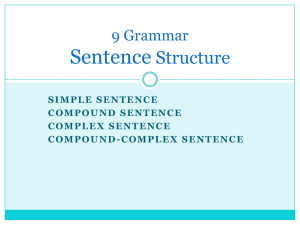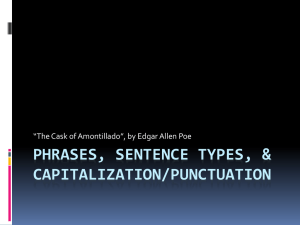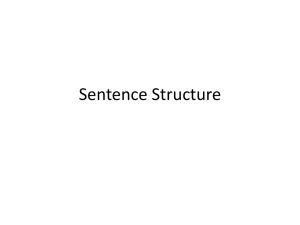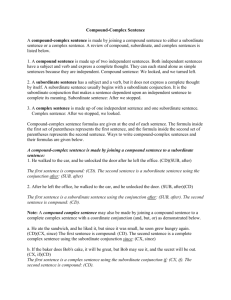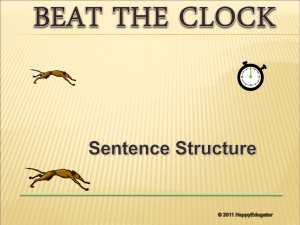Sentence Types
advertisement
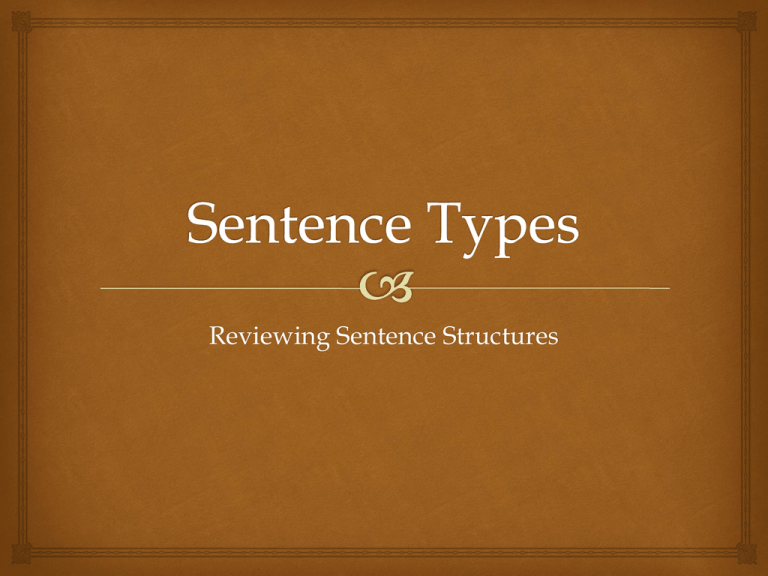
Reviewing Sentence Structures Jan went shopping and left her credit card at home. (simple = one simple sentence with compound predicate) Jan went shopping, and she left her credit card at home. (compound = two simple sentences) Jan went shopping and discovered that she left her credit card at home. (complex = one main clause + one subordinate clause) Jan went shopping, and she discovered that she left her credit card at home. (compound-complex = two main clauses + (at least) one subordinate clause ) Main clause Subordinate clause Step one: Ask yourself if you are looking at one sentence or two sentences You will automatically eliminate two of the four choices. Step two: If you know you have only one sentence … your choices are simple (no subordinate clause present) or complex (subordinate clause present) Look to see if you have a subordinate clause! Examples of Simple Sentence The Baylor Bears and Oklahoma Sooners played an exciting game over the weekend. Taylor Swift won a top honor at the American Music Awards last night. The twins wrestled on the floor and jumped off the bunk beds. Examples of Complex Sentences When she heard her name announced, Taylor appeared surprised. After the final seconds elapsed on the game clock, the fans stormed the field. It will be nice to see family and play games when the Thanksgiving holiday arrives Step three: If you know you have two sentences … your choices are compound (no subordinate clause present) or compound-complex (subordinate clause present) Look to see if you have a subordinate clause! Punctuating Compound Sentences Use a comma and coordinating conjunction between the two independent clauses. Ex. She received a gift, and she wrote a thank you note. Use a semi-colon to combine the two independent clauses. Ex. She received a gift; she wrote a thank you note. Use a semi-colon and a conjunctive adverb followed by a comma to join the independent clauses. She received a gift; however, she did not write a thank you note. Punctuating Complex Sentences If the subordinate clause starts the sentence, you will most of the time use a comma. Ex. Because she received a gift, she wrote a thank you note. If the main clause comes first, no punctuation is necessary. Ex. She wrote a thank you note since she received a gift. Examples of Compound Sentences My family are fans of Baylor, and our friends from Dallas are fans of Oklahoma. Oklahoma played well, but Baylor played better. It will be nice to have a few days off this week, but it will be nicer to have a longer break in December and January. Punctuating Compound-Complex Sentences Remember to follow the same rules for punctuating compound and complex sentences because those rules can be applied to punctuating this type of sentence. Ex. Because she received a gift, she decided to write a thank you note, and her mother who gave her the gift was grateful that her daughter used such good manners. Examples of Compound-Complex Sentences When my niece and nephews went to the football game, they were wearing their team’s spirit gear, but one of my nephews had a hat for one team and a shirt for the other. Some of my students will travel over the holiday, and they will enjoy time in another place while other students will stay close to home. No Subordinate Clause Contains a subordinate clause One sentence Two sentences S CX CD CC Example of Varied Sentence Structures from Literature- TKAM “She was horrible (simple). Her face was the color of a dirty pillowcase, and the corners of her mouth glistened with wet, which inched like a glacier down the deep grooves enclosing her chin (compound-complex). Oldage liver spots dotted her cheeks, and her pale eyes had black pinpoint pupils (compound). Her bottom plate was not in, and her upper lip protruded; from time to time she would draw her nether lip to her upper plate and carry her chin with it (compound). This made the wet move faster (simple). --Scout’s description of Mrs. DuBose, Chapter 11 Practice Sentences Practice identifying the types of sentence structures in the following sentences. 1. Jonas Salk and Albert Sabin developed the polio vaccine. 2. We watched the basketball game, and then we went out to eat at our favorite restaurant. 3. The battery was dead, but the gas tank was full. 4. The library was empty and quiet. 5. Until their mother called them home, the children played happily. 6. Although I didn’t brew it long, the coffee tastes bitter, and I will not drink it. 7. When the college freshman left home, her parents got her a used car. 8. After the doctor prescribed the medication, Angela still felt sick for the rest of the day, but she felt better the next morning. 9. When the art student finished his drawing, he framed it for his parents. 10. The rescue helicopter plucked the extreme skiers from the mountainside. Key to Practice Sentences 1. Simple 2. Compound 3. Compound 4. Simple 5. Complex 6. Compound-Complex 7. Complex 8. Compound-Complex 9. Complex 10. Simple
